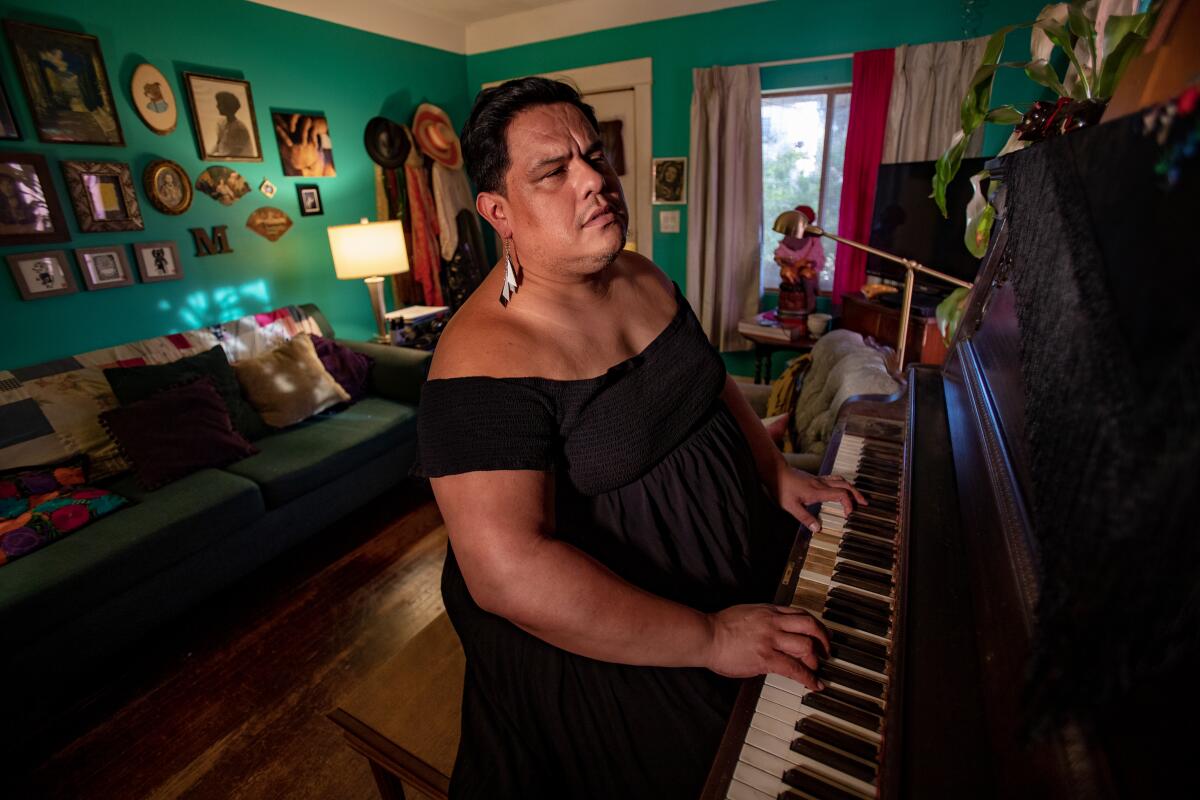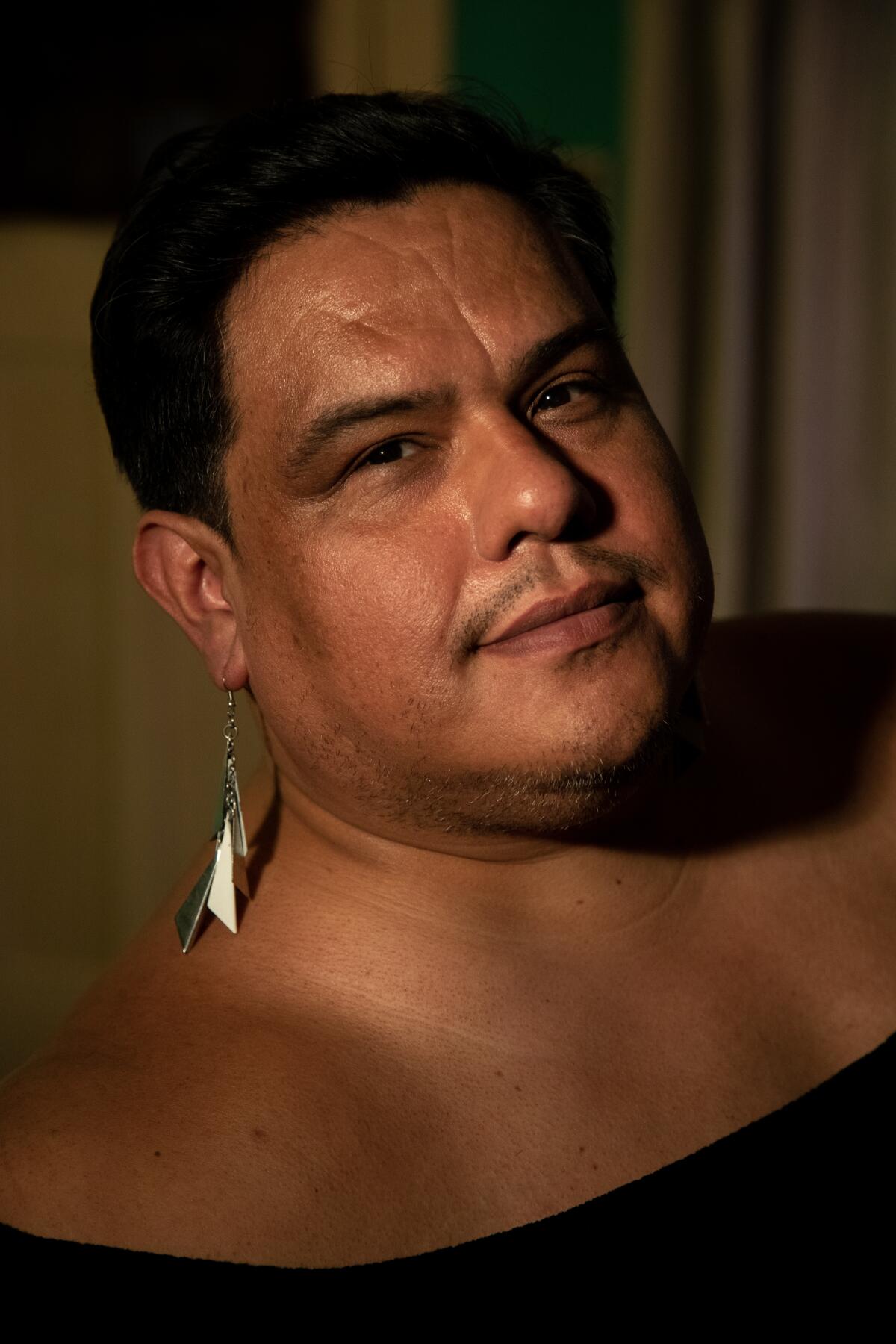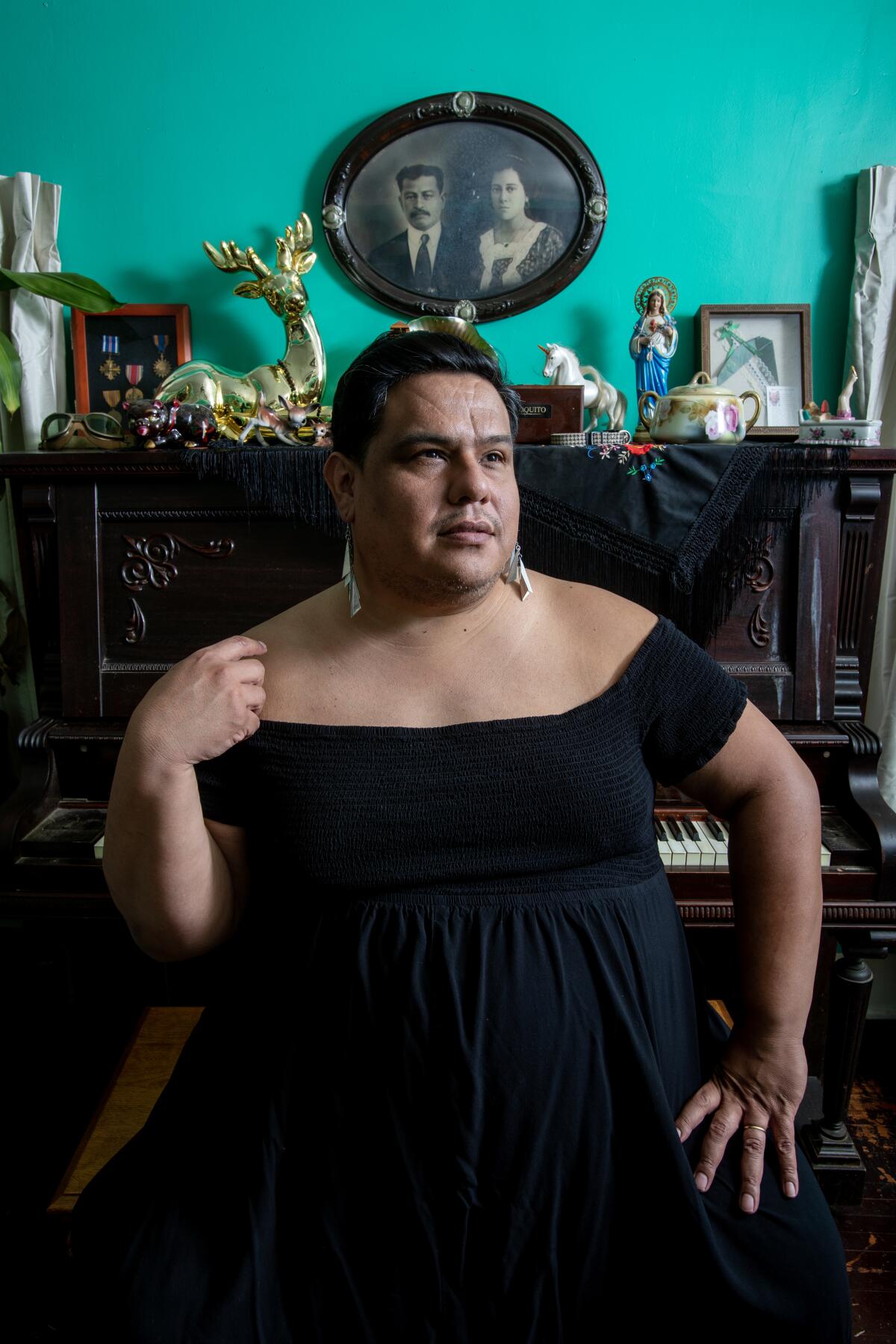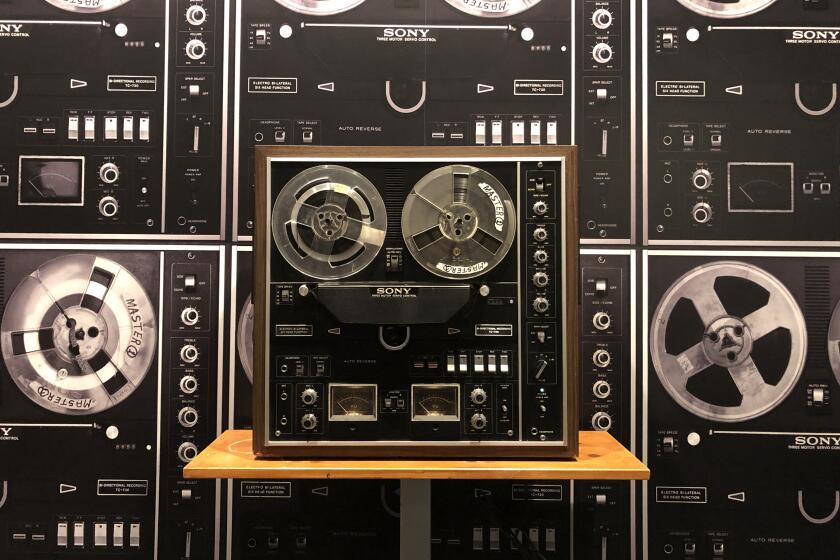L.A. multidisciplinary artist Dorian Wood once resented her ‘weird outsider perspective.’ Now she embraces it

- Share via
In recent years, L.A. artist Dorian Wood has been considering how artists are often asked to “tick off boxes and dangle our familial, individual and ancestral traumas in front of the world to see in order to be taken seriously as artists.” Her work, while grappling with a current of melancholy, finds a space in between.
A musician, performance artist and singer who has performed in museums and art spaces across L.A. and around the world, while also releasing several albums and music videos, Wood’s creative approach comes to an apex in “Canto de Todes (Song of Everyone),” a durational music performance and installation opening at REDCAT on Feb. 3. The 12-hour performance includes three movements: an hourlong live chamber music performance; a 10-hour immersive experience with prerecorded compositions, intermittent live music and projections; and an hourlong cantata. The final movement, “La Hill,” pays homage to Wood’s Costa Rican-Nicaraguan family. Collaborators include Michael Corwin, cellist Adrián Cortés, vocalist Carmina Escobar and vocalist Roco Córdova.
“Canto de Todes” also nods to folk music’s ability to create familiarity yet also call for social change; artists such as Violeta Parra, Víctor Jara, Mercedes Sosa and Inti-Illimani have inspired Wood over the years.
“I’m someone who really embraces the idea that even in that darkness, there can be enormous celebration,” says Wood. “I believe that a lot of Latinx cultures really embrace that — the idea that we can cry and laugh heartily in the same breath. The songs and the stories that we share with each other all come from that kind of reality.”
The Vincent Price Art Museum is showing work by 30 sonic artists, from punk band Nervous Gender to experimental composers Raven Chacon and Guillermo Galindo
Dorian Wood’s connection to music stretches far back into her childhood. Her grandfather, Costa Rican pianist Calasanz Alvarez, hoped to become a music professor when he arrived in the U.S. But due to not having the right accreditation, he worked in the mailroom at USC. That didn’t stop him from enrolling Wood in music classes through the university, where Wood says she played in a piano recital at 5 years old.
But at age 10, Wood started to push against the traditional approach to piano, quitting the instrument for some time as a form of rebellion. Yet, she knew she could sing.
“Since I was brought up really appreciating classical music as the highest form of music, I figured that the highest pursuit that one could follow as a vocalist would be opera,” says Wood.
After her parents split up, Wood’s mother raised her and her sisters as a single mom; the family moved to Costa Rica, where Wood attended an arts high school and focused on theater. Performance became an essential part of the artist’s life.
“I was chubby, awkward, effeminate. So all of these things meant that just sitting very still somehow made me very different than everyone else,” says Wood. “At that point, I decided to use that to my advantage. I found that theater was a way to combine both the voice and the physical presence.”
Wood’s family eventually moved to Florida, but Wood relocated to L.A. at 17, briefly living with her father before getting her own place in Los Feliz.
Wood says her mother’s defiant spirit and frank approach to discussing the U.S.’s history of oppression with the artist at a young age served as a huge inspiration. Her mother often told her: “No aguantas nada” (which translates roughly to “don’t put up with anything.”) That ethos felt even more significant in Wood’s early adulthood, as she began to embrace her queerness and gender fluidity.
“There was always this weird outsider perspective that I initially resented and have learned to just embrace as the totality of who I am and what my voice is,” says Wood.
After a few semesters at Los Angeles City College, Wood spent her days making music on a boombox and starting bands — eventually “falling in with the wrong crowd.”
Now, Wood lives in Eagle Rock with her husband, a home they’ve been in for a little more than a decade. She’s been an artist in residence everywhere from Texas to Spain, and her oeuvre includes short films, live performances, various albums and EPs, video installations and original compositions. The artist’s not-safe-for-work 2013 music video for the track “La Cara Infinita,” featuring Eddika Organista, gained major attention across the internet upon its release, with more than 60,000 views today. The video stars a nude Margaret Cho defiantly standing on a pedestal as Wood holds two male nude figures between her arms. Wood brusquely grabs one of the men; another shot shows one of them trying to escape.
The dedication at the beginning of the video (“for j. deitch”) might ring a bell. The track took as its spark the lack of male nudity (only female) at the 2011 Museum of Contemporary Art gala in which Wood performed as part of Marina Abramović’s curation of live singing heads and bodies at the gala tables.

Over the years, Wood has transformed songs — calling them covers seems too reductive — by contemporary names such as Fiona Apple, Sia and Prince. Many of the artist’s YouTube videos feature comments, in English and Spanish, that frame Wood’s work as heartbreaking and chill-inducing.
Folk music also plays an important role in her artistic development and process. A 2015 performance features a slowed-down, minor-key rendition of “Caballo Viejo” — a Venezuelan folk song written by Simón Díaz — with an additional verse including lines like “caballo le dan sabana y sigue vivo el cabrón / el rey por la mañana aún se cree muy matón / al dar su espalda a la familia / ha perdido la razón.”
Her 2016 performance of Juan Gabriel’s “Yo No Nací Para Amar” at Human Resources performance space takes the song to operatic heights; Wood’s hands shake with emotion as sweat drips down her face. A chamber music homage to Chavela Vargas, “Xavela Lux Aeterna,” toured from 2019 to 2020, with stops in Spain and Mexico City. And in 2020, Wood released the albums “Ardor” and “Reactor,” the result of her residency at Human Resources, which included recording sessions with guitarist Michael Corwin. Many of the tracks came from a single take, lending an urgency and rawness to the albums, which Wood described as “love letters to activists, medical workers, and service workers everywhere.”
The recorded audio in Friday’s performance of “Canto de Todes” features layered vocals that can be at turns cacophonous and haunting. Wood presented a four-hour preview in 2019 at Etopia Centro de Arte y Tecnología in Zaragoza, Spain, the result of a six-week residency. She envisioned the installation as a space where the audience could move around freely, rather than feeling obligated to stay in one place.
“That’s something very common in elitist mentalities that drive the art world — if you don’t practice a certain type of composure, then this world is not for you and you’re not welcome,” says Wood. “I’ve always been in defiance of that.”

Wood hopes “Canto de Todes” will tour, giving more audiences a chance to step into the installation, with each region and social moment changing the nature of the project. One theme will remain the same, though: an environment of inclusion and space to lay feelings down however the audience sees fit.
“I detect a universal hunger for spaces that welcome us with that kind of raw curiosity to express and share and embody and process this incredibly tumultuous and uncertain time that we are still living, in so many ways,” says Wood.
'Dorian Wood: Canto de Todes'
Where: REDCAT, 631 West 2nd Street, Los Angeles, CA 90012
When: Friday, Feb. 3, 8:30 p.m.
Price: $20
Runtime: Approx. 12 hours, continuous.
Contact: +1 (213) 237 2800, [email protected]
More to Read
The biggest entertainment stories
Get our big stories about Hollywood, film, television, music, arts, culture and more right in your inbox as soon as they publish.
You may occasionally receive promotional content from the Los Angeles Times.











